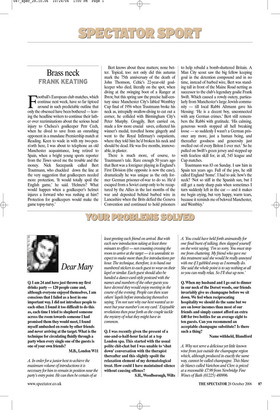Brass neck
FRANK KEATING
Football’s European club matches, which continue next week, have so far tiptoed around in such predictable outline that only the obsessed have been bothered — leaving the headline writers to continue their lather over recriminations about the serious head injury to Chelsea’s goalkeeper Petr Cech, when he dived to save from an onrushing opponent in a mundane Premiership match at Reading. Keen to wade in with my two-penn'orth here, I was about to telephone an old Manchester acquaintance, long retired to Spain, when a bright young sports reporter from the Times saved me the trouble and the money. Nick Szczepanik called Bert Trautmann, who chuckled down the line at the very suggestion that goalkeepers needed more protection, ‘It would totally spoil the English game,’ he said. ‘Helmets? What would happen when a goalkeeper’s helmet injures a forward who was rushing at him? Protection for goalkeepers would make the game topsy-turvy.’ Bert knows about these matters; none better. Topical, too: not only did this autumn mark the 75th anniversary of the death of John Thomson, Celtic’s 22-year-old goalkeeper who died, literally on the spot, when diving at the swinging boot of a Ranger at Ibrox; but this spring saw the precise half-century since Manchester City’s fabled Wembley Cup final of 1956 when Trautmann broke his neck as, intrepidly swallow-diving to cut out a corner, he collided with Birmingham City’s Peter Murphy. Groggily, Bert carried on, made a few more crucial saves, collected his winner’s medal, travelled home gingerly and went to the Royal Infirmary’s outpatients, where they told him he’d broken his neck and should be dead. He was five months, immoveable, in plaster.
There is much more, of course, to Trautmann’s tale. Rare enough 50 years ago that Bert was a foreigner playing in England’s First Division (the opposite is now the case), dramatically he was unique as the only former German prisoner-of-war to do so. He’d escaped from a Soviet camp only to be recaptured by the Allies in the last months of the war and deposited behind barbed wire in Lancashire when the Brits defied the Geneva Convention and continued to hold prisoners to help rebuild a bomb-shattered Britain. A Man City scout saw the big fellow keeping goal in the detention compound and in no time, instead of barbed wire, Bert was standing tall in front of the Maine Road netting as successor to the club’s legendary goalie Frank Swift. Which caused a rowdy outcry, particularly from Manchester’s large Jewish community — till local Rabbi Altmann gave his blessing: ‘He is a decent boy, unconnected with any German crimes.’ Bert still remembers the Rabbi with gratitude. ‘His calming, generous words stopped all hell breaking loose — so suddenly I wasn’t a German prisoner any more, just a human being, and thereafter goodness and generosity just swelled out of every Briton I ever met.’ So he pulled on Swift’s green jersey and stepped up with fearless skill for, in all, 545 league and Cup matches.
Trautmann was 83 on Sunday. I saw him in Spain ten years ago. Full of the joys, he still called England ‘home’. I had to ask: how’s the neck? ‘Not so stiff in the Spanish sun, but I still get a nasty sharp pain when sometimes I turn suddenly left in the car — and it makes me begin crying, but very happy, warm tears, because it reminds me of beloved Manchester, and Wembley.’


























































































 Previous page
Previous page